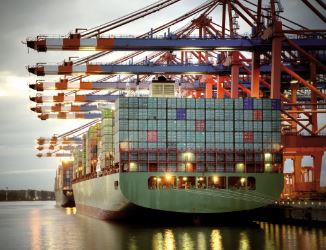[vc_row][vc_column width=”1/2″][vc_column_text]
Denmark
The light green area is the rest of the European Union
Denmark was the 36th largest economy in the world by nominal GDP in 2018. GDP per capita is $60,726, which is above the average for high income and OECD countries, and is among the highest in the world. It is a well-developed and open economy. It is ranked 17th in the World Bank's Human Capital Index and 8th in the Logistics Performance Index. It is a member of the EU and OECD. It is not a member of the eurozone but instead pegs its currency (krone) to the euro. Denmark is an example of the Nordic model, characterised by an internationally high tax level, and a correspondingly high level of government-provided services. Services was the largest economic sector in 2018 (65 percent of GDP), followed by manufacturing (12.6 percent), and agriculture (1 percent). In 2017, the largest export sectors were services (39.45 percent), chemicals (15.13 percent), agriculture (13.8 percent), and machinery (10.1 percent). The largest individual exports were transport services (21.19 percent), ICT services (12.8 percent), and packaged medicaments (8.5 percent). Its largest export partners were Germany (13.4 percent), Sweden (10.73 percent), USA (7.25 percent), UK (6.2 percent), and Norway (5.63 percent). The largest goods imports were cars (4.89 percent), packaged medicaments (3.45 percent), refined petroleum (3.1 percent), and crude oil (2.4 percent). Denmark's economy has long benefitted from free trade, specialisation, and proximity to the large markets of the UK and the Netherlands. Unusually, its modern economy was developed mainly through agriculture, particularly butter and bacon exports to the UK. It was not until the 1950s that manufacturing displaced agriculture in importance. The Danish economy is also unusual in that there were no forced nationalisations of industry in the 20th century and that industry developed without import substitution. Light industry developed organically to supply the domestic market and later began exporting. In the late 1960s, the welfare state was developed as new taxes provided the government with increased income. In 1973, Denmark joined the European Economic Community at the same time as its key trading partner, the UK. However, it has opted out of four areas of EU cooperation, including the euro and a common-defence policy. The economy continues to evolve and rates highly in terms of digitisation and productivity. The economy contracted during the global financial crisis but has since returned to modest growth.
[/vc_column_text][vc_column_text] Its population in 2018 was 5,754,356 [1]
Its population in 2018 was 5,754,356 [1]
 In 2015, 33.17% of its total energy
In 2015, 33.17% of its total energy
consumption was renewable [2]
 In 2021, its GDP grew by 4.69% [2]
In 2021, its GDP grew by 4.69% [2]
 In 2021 it had a positive Current
In 2021 it had a positive Current
Account Balance of US$bn 33.14 [3]
 Its unemployment rate in 2021 was 5.08% [3]
Its unemployment rate in 2021 was 5.08% [3]
 Its Expenditure on R&D (as a percentage of
Its Expenditure on R&D (as a percentage of
GDP) in 2020 was 2.96% [2]
 A Big Mac will set you back the
A Big Mac will set you back the
local equivalent of US$4.60 [4]
What free trade areas or economic unions is it a member of?
Member of the European Union (EU) since 01/01/1973
Other members:
Austria, Belgium, Bulgaria, Croatia, Cyprus, Czechia, Estonia, Finland, France, Germany, Greece, Hungary, Ireland, Italy, Latvia, Lithuania, Luxembourg, Malta, Netherlands, Poland, Portugal, Romania, Slovakia, Slovenia, Spain, Sweden
What trade deals are there between European Union and other countries and economic unions?
EU - Andorra Customs Union (from 01/01/1991)
European Single Market (SM) (from 01/01/1993)
EU - Sri-Lanka Co-operation and Partnership Agreement (from 01/04/1995)
EU - Türkiye Customs Union (from 31/12/1995)
EU - Faroe Islands Agreement (from 01/01/1997)
EU - Palestinian Authority Interim Association Agreement (from 01/07/1997)
EU - Tunisia Association Agreement (from 01/03/1998)
EU - Armenia Partnership and Cooperation Agreement (from 09/09/1999)
EU - Morocco Association Agreement (from 01/03/2000)
EU - Israel Association Agreement (from 01/06/2000)
EU - Mexico Global Agreement (from 01/10/2000)
EU - San Marino Customs Union (from 01/04/2002)
EU - Jordan Association Agreement (from 01/05/2002)
EU - North Macedonia Stabilisation and Association Agreement (from 01/04/2004)
EU - Pakistan Co-operation agreement (from 29/04/2004)
EU - Egypt Association Agreement (from 01/06/2004)
EU - Chile Association Agreement and Additional Protocol (from 01/03/2005)
EU - Algeria Association Agreement (from 01/09/2005)
EU - Lebanon Association Agreement (from 01/04/2006)
EU - Albania Stabilisation and Association Agreement (from 01/04/2009)
EU - Pacific States Interim EPA (from 20/12/2009)
EU - Montenegro Stabilisation and Association Agreement (from 01/05/2010)
EU - Central America Association Agreement (from 01/08/2013)
EU - Serbia Stabilisation and Association Agreement (from 01/09/2013)
EU - Bosnia and Herzegovina Stabilisation and Association Agreement (from 01/06/2015)
EU - South Korea Free Trade Agreement (from 01/07/2015)
EU - Kosovo Stabilisation and Association Agreement (from 01/04/2016)
EU - Georgia Association Agreement (from 01/07/2016)
EU - Moldova Association Agreement (from 01/07/2016)
EU - Canada Comprehensive Economic and Trade Agreement (CETA) (from 21/09/2017)
EU - Eswatini (SADC) Economic Partnership Agreement (from 05/02/2018)
EU - Lesotho (SADC) Economic Partnership Agreement (from 05/02/2018)
EU - Mozambique (SADC) Economic Partnership Agreement (from 05/02/2018)
EU - Namibia (SADC) Economic Partnership Agreement (from 05/02/2018)
EU - South Africa Economic Partnership Agreement (from 05/02/2018)
EU - Botswana (SADC) Economic Partnership Agreement (from 05/02/2018)
EU - Japan Economic Partnership Agreement (from 01/02/2019)
EU - Eastern and Southern Africa States free trade agreement (from 07/02/2019)
UK - EU Trade Deal (from 01/01/2021)
[/vc_column_text][vc_column_text]What trade deals are there with other countries and economic unions?
None
[/vc_column_text][/vc_column][vc_column width=”1/2″][vc_column_text]A Memorable Faux Pas: Warren Buffett Gets His Facts Wrong
Ross Jackson: A Silver Lining to Europe’s Troubles
World Economic Forum: Chile and Colombia Best in Entrepreneurial Vitality
United Kingdom – Splitting Rage Takes Root
OECD: Time, Trade and Trade Facilitation
Sampension: PPP as a Way Forward for a Modern Welfare System
Global Wage Report
Trade with the United Kingdom
Source: UK Office for National Statistics, October 2022.
Contains public sector information licensed under the Open Government Licence v3.0.
Loading, Please Wait!
This may take a second or two.






















































































